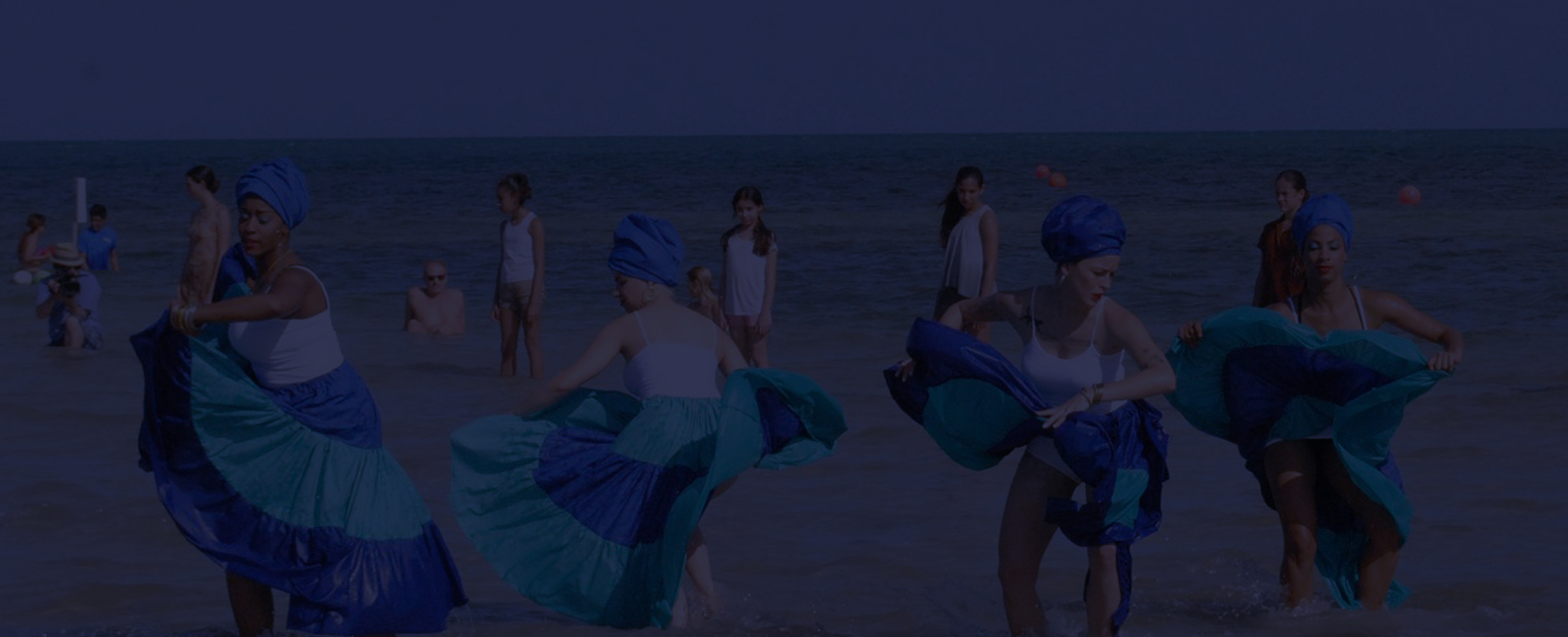
Festival
The festival, created in 1997 by the director of the company Neri Torres, is a strategic and necessary space to promote dialogue between Afro-Cuban dances and those similar embodied expressions that thrive outside formal or conceptual dance. In the age of diversity, equity, and inclusion, it is important to highlight the sense of belonging, pride and joy dances from the people of the Diaspora bring to our communities. Recognizing the many roots and routes of immigrant populations in Miami, the festival program also celebrates the interdependency of cultural traits among and between Cubans, Latin-Americans, Anglo-Americans, Europeans and other peoples of Caribbean and African origins.
Every year, practitioners, culture lovers, scholars and people from all walks of life hailing from as far away as Japan, Canada, California, Belgium, Spain, Chicago, Boston, New York City, Atlanta and Washington, DC meet not only to dance, but to reflect on issues related to the current state of dance and culture in our society. In addition, the festival offers a wide variety of exciting workshops in Afro-Cuban traditions along with diverse guest dance styles, dance parties, panels and performances featuring local and guest artists.


IFE-ILE Afro-Cuban Dance Festival & International Caribbean Biennial Dance Conference
The Joy of Dancing: The Embodiment of Freedom
Dates: August 7th to 10th, 2024.
Venues: HistoryMiami Museum (conference plenaries) 101 W Flagler St, Miami, FL 33130
Koubek Center (workshops, performance and closing party) 2705 SW 3rd St, Miami, FL 33135
Pre-opening events at Calle Ocho (August 2nd and 3rd) 1637 SW 8th St, Miami, FL 33135
The conference segment of our festival will include:
– Discussion panels
– Keynote speeches by renowned scholars and practitioners
– Performances
– Final focus group
– Panel Discussion
– Live and virtual Presentations
– Closing Party
For more information
Contact:
Neri Torres,
Conference organizer
Email:ifeiledancecompany@yahoo.com
Dance Workshop Descriptions
Afro-Modern – Dance technique combining Afro-Cuban based dance movements with modern technique, influenced by Graham, Limon, Humphrey and Limon.
Orishas – Sacred African dances originated in the Yoruba traditions of Nigeria– the root of many Cuban popular styles. Dances for Orishas such as Yemaya, Eleggua, Ochun, Oya, etc., which represent omnipresent and anthropomorphous forces of nature
Rumba – It’s and autochthonous Cuban genre of dance and music that has influence several other styles such as Son and the derivative Salsa. Afro-Cuban rumba is entirely different than ballroom Rhumba or the African style of pop music called rumba although they both draw their inspiration from it. Rumba developed in rural Cuba, and is very much alive in Havana, Mantanzas and other Cuban cities as well as rural areas. And in all rumba, the clave beat (2-3 or 3-2) plays a very important role. Rumba has three styles: Yambu, Guaguanco and Columbia.
Arará – From the Fon people and the Arara kingdom of the Dahomean region, now known as Benin, Arará rhythms, songs and dances were introduced into Cuba, where many of those rituals and ceremonies are still practiced. One of the main characteristics of this style is the percussive use of the upper spine.
Congo – or Palo traditions come from the Bantú people of Central Africa (particularly from Congo). The Bantú represent the majority of African slaves coming into Cuba during the 17th and early 18th century; later the Yoruba (from Nigeria) became the primary group brought to Cuba as slaves. Drums and hand rattles are used in this music, which is based upon communication with ancestral spirits, the dead, as opposed to the Orishas. The songs and chants, often in a hybrid combination of Spanish and Bantú words, play a central role in the rituals of Palo. Music of this tradition has had a strong influence on popular music forms like Rumba, Son and Mambo. It has three distinctive styles: Yuka.
Cubaton – From the combination of the words Raggaeton and Cuba, this style develop from a fusion of Reggae, Dancehall, Latin Rap and Hip-hop, European club music and Cuban rhythms and culture. Cubaton provoked a music revolution because it has been embraced by the Cuban youth who favored it over Cuban traditional styles (Son, Mambo, Cha-cha-cha, etc.). Among the most popular Cubaton bands is Gente de Zona known as pioneering with popular bands such as Charanga Habanera to create the exciting sound blending Cuban Son and Timba with the style. The dance focuses on erotic and sensual pulsations of the pelvis accompanied by the torso in addition to other body isolations plus a mix of traditional Afro-Cuban dance and hip-hop moves.
Music Workshop Description:
Batá Drumming – Batá drums are a set of three double-headed religious drums: The Iya, Itotele and Okonkolo. Sacred to Yoruba religion (from the Yoruba people of West Africa, primarily Nigeria and Benin) and Santeria, they have also been used in secular music such as salsa and jazz.
Tumbadoras –aka Congas are native from Cuba and have their roots in Congo traditions; hence the commercial version of the name. They have both sacred (ex. Bembe) and popular function. In the instrumentation of Rumba tumbadoras (or Congas) are commonly used in number of threes descending from low, medium to high pitch
Festival prices
General Registration
$150
Early registration (until July 1st) – $200 regular price (Includes access to all events, workshops and performances)
Workshops Only
$150
Single Workshop
Discount packages
$100
Friday
Performance Only
$30
Saturday
Official Hotel Grove 27 by Roami – 1710 SW 27th Ave, Miami, FL 33145


